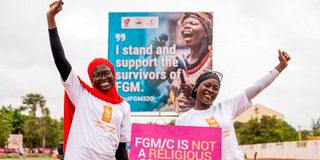The Gambia’s FGM ban a win for all girls and women globally

Gambian activists Rohey Cham and Sainabou Sey celebrate after the country's parliament rejected the bill to end a ban on female genital mutilation in Banjul on July 15, 2024.
What you need to know:
- FGM is not merely a harmful traditional practice; it is a grave violation of human rights.
- As we commend The Gambia, we reaffirm our commitment to the global fight against FGM.
The recent decision by MPs in The Gambia to uphold the ban on female genital mutilation (FGM) is a cause for celebration. Upholding the ban is not only a victory for girls and women in The Gambia but also for all girls and women worldwide.
This decisive action by the MPs serves as a symbol of hope and progress in our collective efforts against a harmful practice that has significantly impacted the health, rights and dignity of countless women and girls.
FGM is not merely a harmful traditional practice; it is a grave violation of human rights that inflicts lifelong physical and psychological trauma on its survivors.
The Gambia’s steadfast commitment to maintaining the ban on FGM is a commendable step forward in safeguarding the well-being of its citizens and protecting future generations from this harmful practice.
UN Secretary-General António Guterres, in his address on the International Day of Zero Tolerance for Female Genital Mutilation, said: “We need decisive action to tackle the social, economic, and political norms that perpetuate discrimination against women and girls, limit their participation and leadership, and restrict their access to education and employment. We need urgent investments to reach the target set in the Sustainable Development Goals of eliminating female genital mutilation by 2030.”
UN Sustainable Development Goal 5 (SDG5) calls for gender equality and empowerment of all women and girls with target 5.3 seeking to eliminate all harmful practices such as child, early and forced marriage, and female genital mutilation.
The Gambia MPs’ decision to uphold the ban on FGM is a significant step towards achieving this target. It underscores the importance of legislative measures in protecting the rights of women and girls and aligns with the broader global commitment to gender equality.
Achieving SDG 5 is not only about legal frameworks, but also about transforming societal attitudes and practices that hinder the progress of women and girls.
By upholding the ban on FGM, The Gambia is not just complying with international mandates, but also actively contributing to the global movement to end gender-based violence and discrimination. This action sets a precedent and provides a model for other nations to follow.
In Kenya, we have been unwavering in our efforts to combat FGM. Through comprehensive legislation, community education and advocacy, we have made significant strides in reducing the prevalence of FGM. However, our fight is far from over.
As we commend The Gambia for its courageous stance, we reaffirm our commitment to the global fight against FGM. In Kenya, we will continue strengthening our initiatives, enhancing cross-border collaborations and supporting survivors in their healing journey.
Our goal is to create a world where every girl can grow up free from the fear of FGM, where her body is her own and where harmful traditions do not hinder her potential.
Ms Loloju is the CEO, Anti-FGM Board





